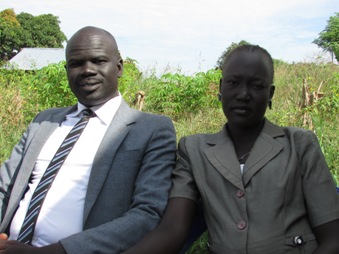S. Sudan couple say inter-marriage a way to restore tribal unity
December 10, 2014 (KIRYANDONGO) – As South Sudanese across the country reflect on a year of chaos and violence, some of the country’s citizens have not let ethnic conflict interfere with two of the most basic human needs: love and marriage.

Nuer and Dinka couples interviewed by Sudan Tribune said they saw a parallel between their nation’s challenges and their own relationship.
South Sudan descended into violence last December following a political dispute in the country’s ruling party, reigniting tribal tensions and rivalries.
Tensions between the Dinka and Nuer tribes has since played out on a national scale, with fighting pitting government troops loyal to president Salva Kiir, who hails from the Dinka tribe, against rebel forces aligned with former vice-president Riek Machar, a Nuer.
Both warring parties stand accused of committing grave human rights abuses, which the UN says may amount to war crimes.
As the nation’s fate hangs in the balance, some South Sudanese are sending a powerful message, rejecting negative stereotypes based on ethnicity.
Noami Nyantoc, a 22-year-old mother of one, married a Nuer man three years ago.
Nyantoc met her husband in 2010 and said her parents had demanded a dowry of 60 cows for her hand in marriage.
She says those first introductions to her parents had not been easy, but they eventually agreed to the union after her fiancé fulfilled the dowry demands.
Nyantoc, who currently resides at Uganda’s overcrowded Kiryandongo resettlement camp, says she often faces criticism over her marriage from both Nuer and Dinka tribe members.
She says she rejects those criticisms by saying the nation’s interests should come before those of the tribe.
“There are [the] rest of people who can tell me to leave your husband, but for my parents who receive cows [for my dowry and] who agree to give me to this man they cannot do anything; they are not talking like that it just external people are the ones talking,” she told Sudan Tribune.
“I cannot tell them that I am going to leave my home. I just tell [them that there is] no problem [and] that [this] place is good for me,” she added.
Nyantoc insists that her marriage is a symbol of unity that it is possible to achieve this on a wider scale between the Nuer and Dinka communities.
She also believes that ongoing peace talks to resolve the crisis would have made more progess if women had been allowed to take part, going so far as to urge more women urge South Sudanese women across the country to continue to marry outside of their own tribes.
She said love cuts across tribal divides and cannot be stopped by war as it is a personal decision between two people.
Another thing that binds the Dinka and Nuer communities is the historical tradition of keeping cattle, with both communities relying on their cattle for their livelihoods, not only as economic resources, but as capital for paying dowries. And in both communities, young men compete aggressively for the most beautiful girls.
Nyantoc’s husband, Makuei Ruot Gang, is a Nuer from Unity state’s Mayom county.
Gang said he initially didn’t believe in inter-marriage, but his opinion changed after meeting his future wife.
He said it had not been easy in the beginning to convince Nyantoc to pursue a relationship with him, but over time both agreed they wanted to become husband and wife.
Gang says the couple eventually married in 2011, prior to the outbreak of the current conflict.
He said both families participated peacefully in the wedding ceremony and their union had been solid enough to withstand the ongoing turmoil.
“In fact, I cannot say the ongoing conflict in our country can destroy our relationship,” he said.
“The conflicts came and we are already a family, so I believe that this conflict will never, never destroy our relationship as a family,” he added.
Gang says his fellow tribesmen and women have never criticised him for intermarrying with a Dinka girl, instead appreciating the role his wife plays in the family.
“We have a spirit as South Sudanese to marriage one another that is inter-marriage, so this is the kind that can reduce conflicts,” he said.
(ST)
